Malaysian Contract Law: Indemnity, Sale, Agency, and Hire Purchase
VerifiedAdded on 2023/06/13
|5
|1433
|307
Homework Assignment
AI Summary
This assignment provides a detailed overview of several key aspects of Malaysian contract law. It begins by explaining the concept of contracts of indemnity under Section 77 of the Malaysian Contract Act 1950, along with an analysis of contracts of sale as defined by the Sale of Goods Act 1957, including the essential elements of offer and acceptance. The assignment then discusses agency, detailing the various classifications of agents and the legal implications of their actions, including termination of agency upon the principal's death. Furthermore, it addresses the enforceability of contracts with illegal intentions and the remedies available in cases of fraud. Finally, the assignment explores the conditions and warranties implied in hire-purchase agreements under the Hire Purchase Act 1967, along with the rights of a hirer, such as the right to obtain information, appropriation of payment, and early termination.
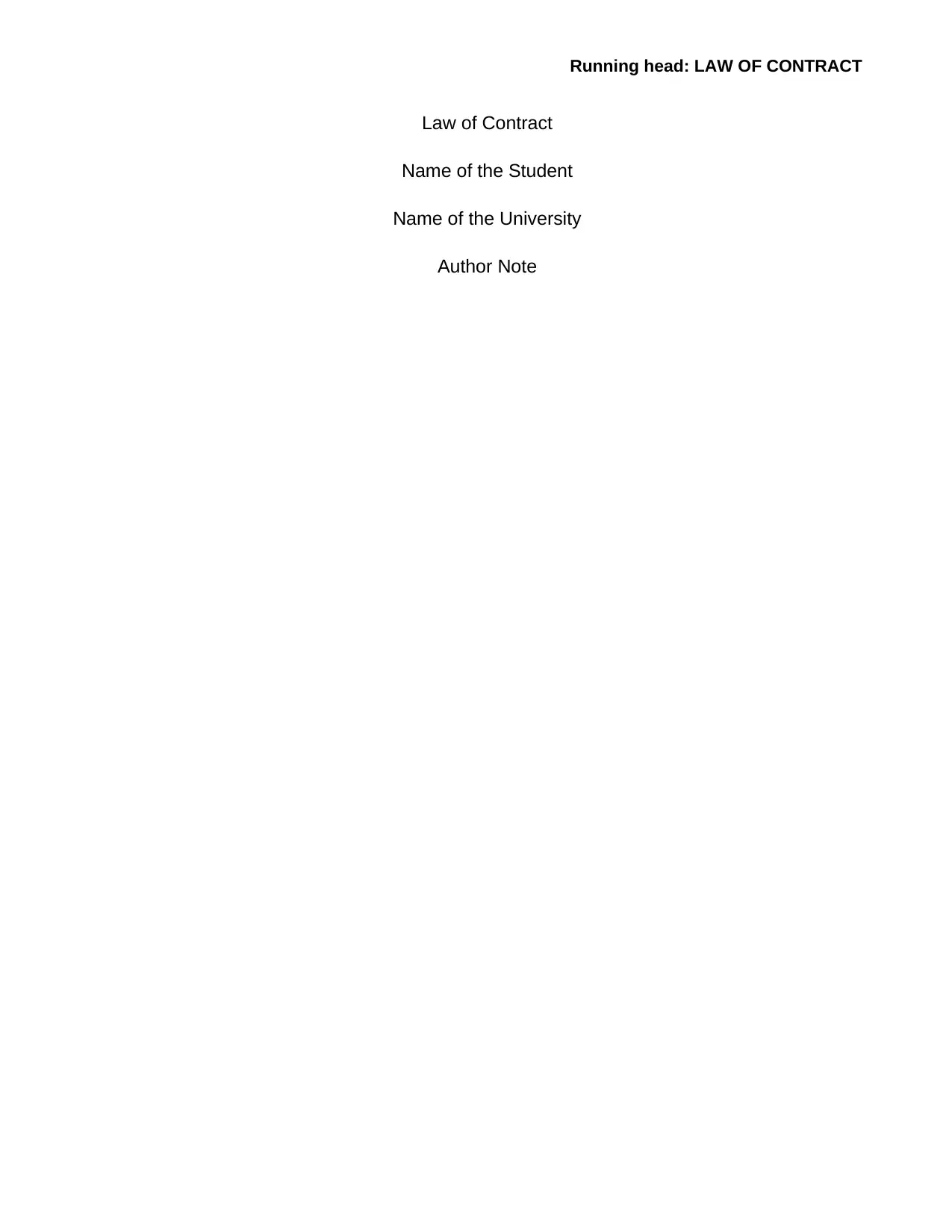
Running head: LAW OF CONTRACT
Law of Contract
Name of the Student
Name of the University
Author Note
Law of Contract
Name of the Student
Name of the University
Author Note
Paraphrase This Document
Need a fresh take? Get an instant paraphrase of this document with our AI Paraphraser
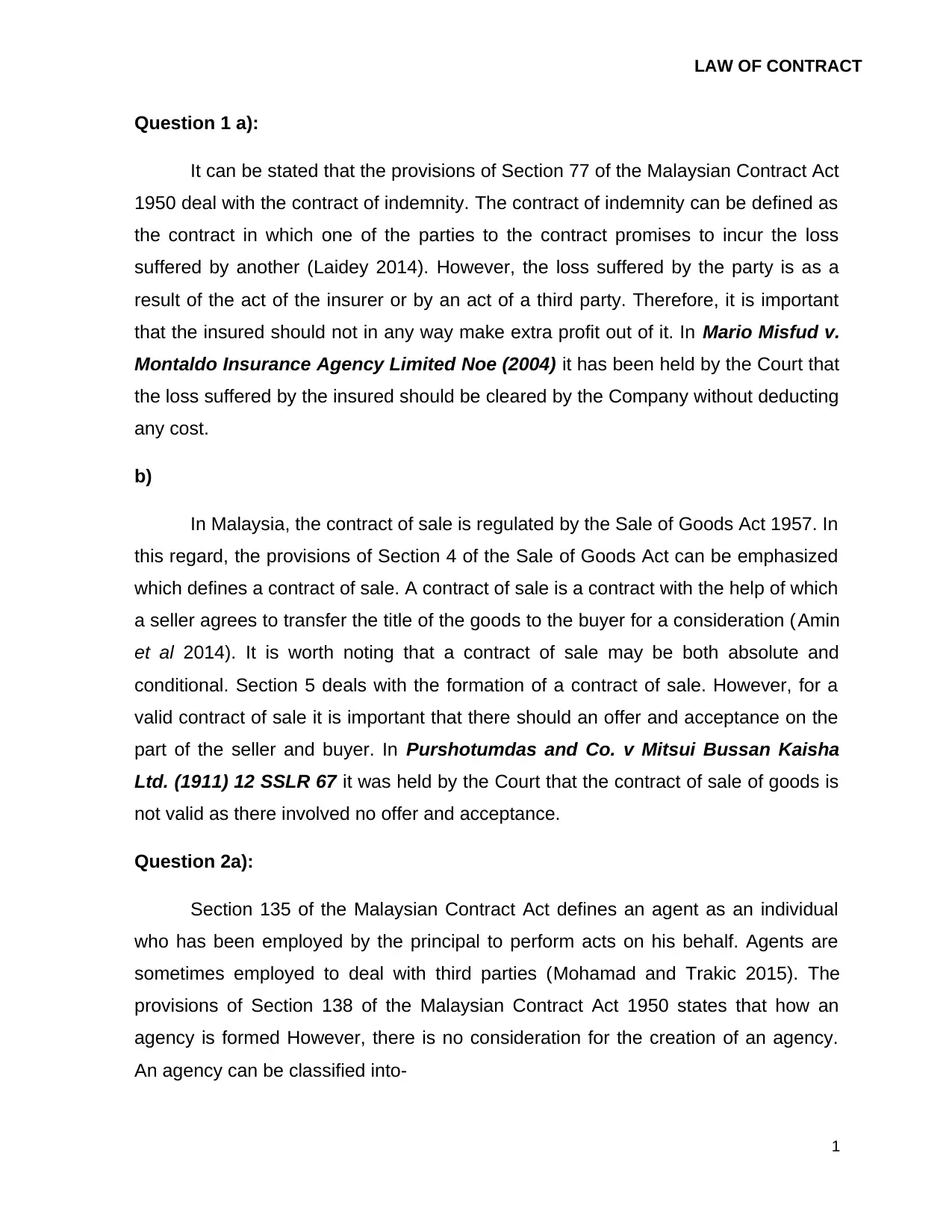
LAW OF CONTRACT
Question 1 a):
It can be stated that the provisions of Section 77 of the Malaysian Contract Act
1950 deal with the contract of indemnity. The contract of indemnity can be defined as
the contract in which one of the parties to the contract promises to incur the loss
suffered by another (Laidey 2014). However, the loss suffered by the party is as a
result of the act of the insurer or by an act of a third party. Therefore, it is important
that the insured should not in any way make extra profit out of it. In Mario Misfud v.
Montaldo Insurance Agency Limited Noe (2004) it has been held by the Court that
the loss suffered by the insured should be cleared by the Company without deducting
any cost.
b)
In Malaysia, the contract of sale is regulated by the Sale of Goods Act 1957. In
this regard, the provisions of Section 4 of the Sale of Goods Act can be emphasized
which defines a contract of sale. A contract of sale is a contract with the help of which
a seller agrees to transfer the title of the goods to the buyer for a consideration (Amin
et al 2014). It is worth noting that a contract of sale may be both absolute and
conditional. Section 5 deals with the formation of a contract of sale. However, for a
valid contract of sale it is important that there should an offer and acceptance on the
part of the seller and buyer. In Purshotumdas and Co. v Mitsui Bussan Kaisha
Ltd. (1911) 12 SSLR 67 it was held by the Court that the contract of sale of goods is
not valid as there involved no offer and acceptance.
Question 2a):
Section 135 of the Malaysian Contract Act defines an agent as an individual
who has been employed by the principal to perform acts on his behalf. Agents are
sometimes employed to deal with third parties (Mohamad and Trakic 2015). The
provisions of Section 138 of the Malaysian Contract Act 1950 states that how an
agency is formed However, there is no consideration for the creation of an agency.
An agency can be classified into-
1
Question 1 a):
It can be stated that the provisions of Section 77 of the Malaysian Contract Act
1950 deal with the contract of indemnity. The contract of indemnity can be defined as
the contract in which one of the parties to the contract promises to incur the loss
suffered by another (Laidey 2014). However, the loss suffered by the party is as a
result of the act of the insurer or by an act of a third party. Therefore, it is important
that the insured should not in any way make extra profit out of it. In Mario Misfud v.
Montaldo Insurance Agency Limited Noe (2004) it has been held by the Court that
the loss suffered by the insured should be cleared by the Company without deducting
any cost.
b)
In Malaysia, the contract of sale is regulated by the Sale of Goods Act 1957. In
this regard, the provisions of Section 4 of the Sale of Goods Act can be emphasized
which defines a contract of sale. A contract of sale is a contract with the help of which
a seller agrees to transfer the title of the goods to the buyer for a consideration (Amin
et al 2014). It is worth noting that a contract of sale may be both absolute and
conditional. Section 5 deals with the formation of a contract of sale. However, for a
valid contract of sale it is important that there should an offer and acceptance on the
part of the seller and buyer. In Purshotumdas and Co. v Mitsui Bussan Kaisha
Ltd. (1911) 12 SSLR 67 it was held by the Court that the contract of sale of goods is
not valid as there involved no offer and acceptance.
Question 2a):
Section 135 of the Malaysian Contract Act defines an agent as an individual
who has been employed by the principal to perform acts on his behalf. Agents are
sometimes employed to deal with third parties (Mohamad and Trakic 2015). The
provisions of Section 138 of the Malaysian Contract Act 1950 states that how an
agency is formed However, there is no consideration for the creation of an agency.
An agency can be classified into-
1
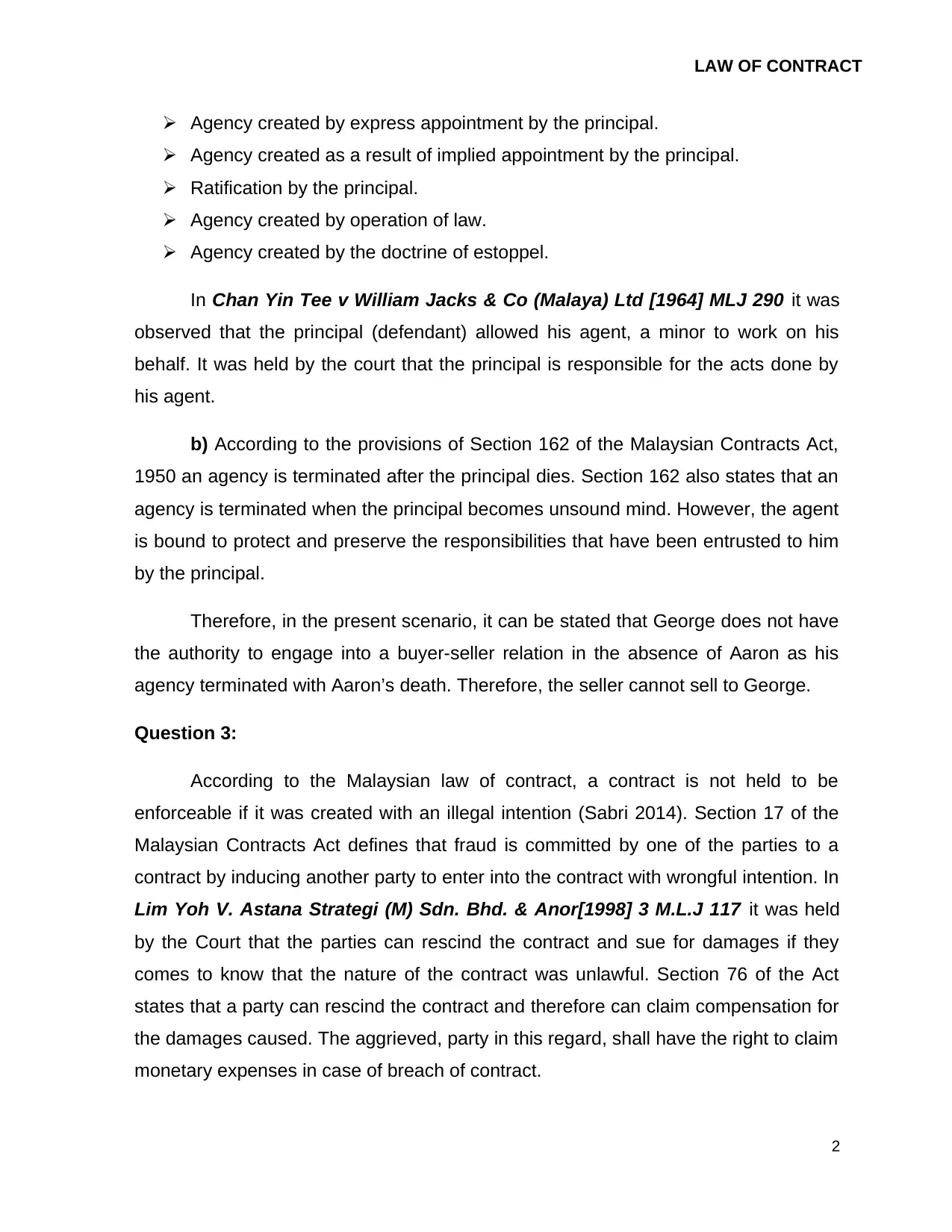
LAW OF CONTRACT
Agency created by express appointment by the principal.
Agency created as a result of implied appointment by the principal.
Ratification by the principal.
Agency created by operation of law.
Agency created by the doctrine of estoppel.
In Chan Yin Tee v William Jacks & Co (Malaya) Ltd [1964] MLJ 290 it was
observed that the principal (defendant) allowed his agent, a minor to work on his
behalf. It was held by the court that the principal is responsible for the acts done by
his agent.
b) According to the provisions of Section 162 of the Malaysian Contracts Act,
1950 an agency is terminated after the principal dies. Section 162 also states that an
agency is terminated when the principal becomes unsound mind. However, the agent
is bound to protect and preserve the responsibilities that have been entrusted to him
by the principal.
Therefore, in the present scenario, it can be stated that George does not have
the authority to engage into a buyer-seller relation in the absence of Aaron as his
agency terminated with Aaron’s death. Therefore, the seller cannot sell to George.
Question 3:
According to the Malaysian law of contract, a contract is not held to be
enforceable if it was created with an illegal intention (Sabri 2014). Section 17 of the
Malaysian Contracts Act defines that fraud is committed by one of the parties to a
contract by inducing another party to enter into the contract with wrongful intention. In
Lim Yoh V. Astana Strategi (M) Sdn. Bhd. & Anor[1998] 3 M.L.J 117 it was held
by the Court that the parties can rescind the contract and sue for damages if they
comes to know that the nature of the contract was unlawful. Section 76 of the Act
states that a party can rescind the contract and therefore can claim compensation for
the damages caused. The aggrieved, party in this regard, shall have the right to claim
monetary expenses in case of breach of contract.
2
Agency created by express appointment by the principal.
Agency created as a result of implied appointment by the principal.
Ratification by the principal.
Agency created by operation of law.
Agency created by the doctrine of estoppel.
In Chan Yin Tee v William Jacks & Co (Malaya) Ltd [1964] MLJ 290 it was
observed that the principal (defendant) allowed his agent, a minor to work on his
behalf. It was held by the court that the principal is responsible for the acts done by
his agent.
b) According to the provisions of Section 162 of the Malaysian Contracts Act,
1950 an agency is terminated after the principal dies. Section 162 also states that an
agency is terminated when the principal becomes unsound mind. However, the agent
is bound to protect and preserve the responsibilities that have been entrusted to him
by the principal.
Therefore, in the present scenario, it can be stated that George does not have
the authority to engage into a buyer-seller relation in the absence of Aaron as his
agency terminated with Aaron’s death. Therefore, the seller cannot sell to George.
Question 3:
According to the Malaysian law of contract, a contract is not held to be
enforceable if it was created with an illegal intention (Sabri 2014). Section 17 of the
Malaysian Contracts Act defines that fraud is committed by one of the parties to a
contract by inducing another party to enter into the contract with wrongful intention. In
Lim Yoh V. Astana Strategi (M) Sdn. Bhd. & Anor[1998] 3 M.L.J 117 it was held
by the Court that the parties can rescind the contract and sue for damages if they
comes to know that the nature of the contract was unlawful. Section 76 of the Act
states that a party can rescind the contract and therefore can claim compensation for
the damages caused. The aggrieved, party in this regard, shall have the right to claim
monetary expenses in case of breach of contract.
2
⊘ This is a preview!⊘
Do you want full access?
Subscribe today to unlock all pages.

Trusted by 1+ million students worldwide
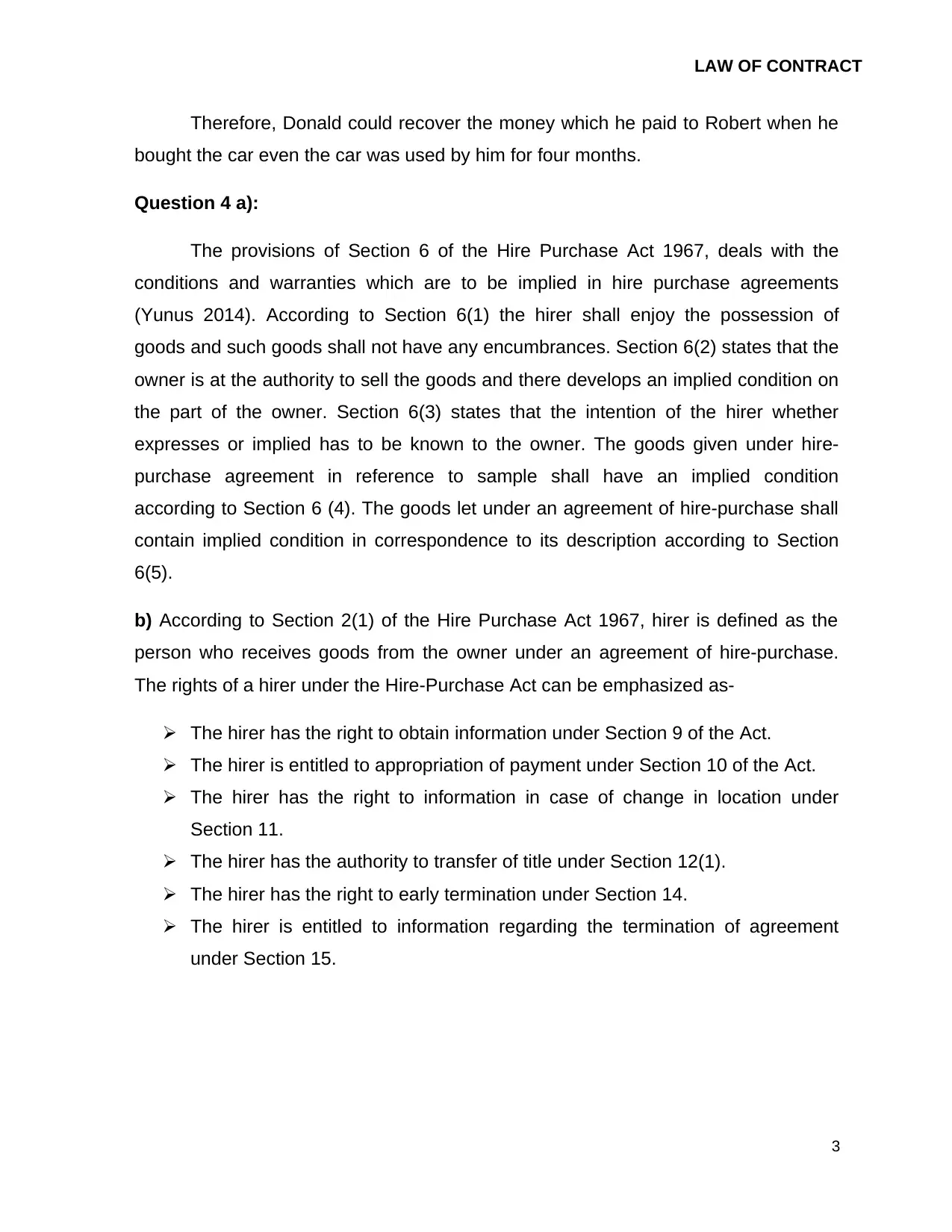
LAW OF CONTRACT
Therefore, Donald could recover the money which he paid to Robert when he
bought the car even the car was used by him for four months.
Question 4 a):
The provisions of Section 6 of the Hire Purchase Act 1967, deals with the
conditions and warranties which are to be implied in hire purchase agreements
(Yunus 2014). According to Section 6(1) the hirer shall enjoy the possession of
goods and such goods shall not have any encumbrances. Section 6(2) states that the
owner is at the authority to sell the goods and there develops an implied condition on
the part of the owner. Section 6(3) states that the intention of the hirer whether
expresses or implied has to be known to the owner. The goods given under hire-
purchase agreement in reference to sample shall have an implied condition
according to Section 6 (4). The goods let under an agreement of hire-purchase shall
contain implied condition in correspondence to its description according to Section
6(5).
b) According to Section 2(1) of the Hire Purchase Act 1967, hirer is defined as the
person who receives goods from the owner under an agreement of hire-purchase.
The rights of a hirer under the Hire-Purchase Act can be emphasized as-
The hirer has the right to obtain information under Section 9 of the Act.
The hirer is entitled to appropriation of payment under Section 10 of the Act.
The hirer has the right to information in case of change in location under
Section 11.
The hirer has the authority to transfer of title under Section 12(1).
The hirer has the right to early termination under Section 14.
The hirer is entitled to information regarding the termination of agreement
under Section 15.
3
Therefore, Donald could recover the money which he paid to Robert when he
bought the car even the car was used by him for four months.
Question 4 a):
The provisions of Section 6 of the Hire Purchase Act 1967, deals with the
conditions and warranties which are to be implied in hire purchase agreements
(Yunus 2014). According to Section 6(1) the hirer shall enjoy the possession of
goods and such goods shall not have any encumbrances. Section 6(2) states that the
owner is at the authority to sell the goods and there develops an implied condition on
the part of the owner. Section 6(3) states that the intention of the hirer whether
expresses or implied has to be known to the owner. The goods given under hire-
purchase agreement in reference to sample shall have an implied condition
according to Section 6 (4). The goods let under an agreement of hire-purchase shall
contain implied condition in correspondence to its description according to Section
6(5).
b) According to Section 2(1) of the Hire Purchase Act 1967, hirer is defined as the
person who receives goods from the owner under an agreement of hire-purchase.
The rights of a hirer under the Hire-Purchase Act can be emphasized as-
The hirer has the right to obtain information under Section 9 of the Act.
The hirer is entitled to appropriation of payment under Section 10 of the Act.
The hirer has the right to information in case of change in location under
Section 11.
The hirer has the authority to transfer of title under Section 12(1).
The hirer has the right to early termination under Section 14.
The hirer is entitled to information regarding the termination of agreement
under Section 15.
3
Paraphrase This Document
Need a fresh take? Get an instant paraphrase of this document with our AI Paraphraser
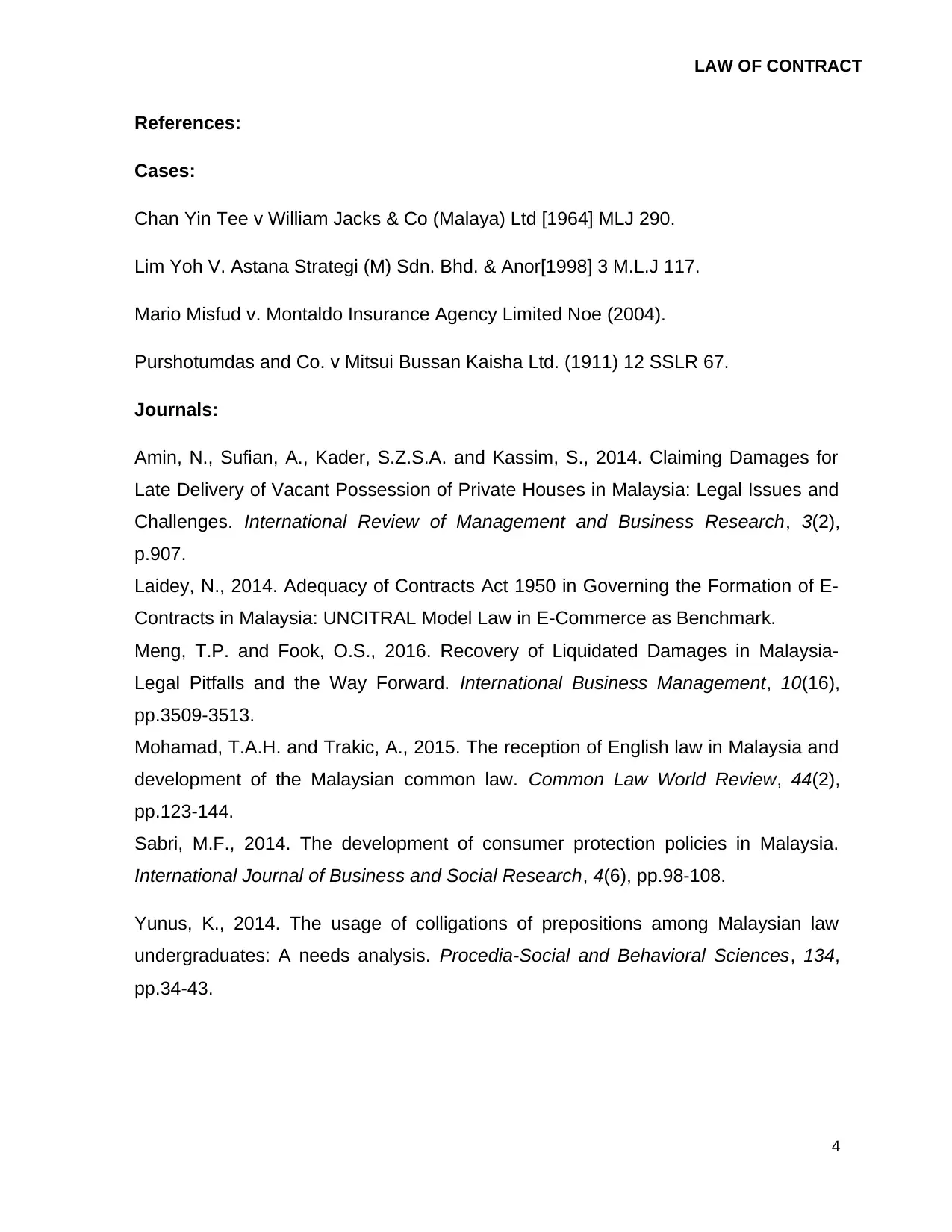
LAW OF CONTRACT
References:
Cases:
Chan Yin Tee v William Jacks & Co (Malaya) Ltd [1964] MLJ 290.
Lim Yoh V. Astana Strategi (M) Sdn. Bhd. & Anor[1998] 3 M.L.J 117.
Mario Misfud v. Montaldo Insurance Agency Limited Noe (2004).
Purshotumdas and Co. v Mitsui Bussan Kaisha Ltd. (1911) 12 SSLR 67.
Journals:
Amin, N., Sufian, A., Kader, S.Z.S.A. and Kassim, S., 2014. Claiming Damages for
Late Delivery of Vacant Possession of Private Houses in Malaysia: Legal Issues and
Challenges. International Review of Management and Business Research, 3(2),
p.907.
Laidey, N., 2014. Adequacy of Contracts Act 1950 in Governing the Formation of E-
Contracts in Malaysia: UNCITRAL Model Law in E-Commerce as Benchmark.
Meng, T.P. and Fook, O.S., 2016. Recovery of Liquidated Damages in Malaysia-
Legal Pitfalls and the Way Forward. International Business Management, 10(16),
pp.3509-3513.
Mohamad, T.A.H. and Trakic, A., 2015. The reception of English law in Malaysia and
development of the Malaysian common law. Common Law World Review, 44(2),
pp.123-144.
Sabri, M.F., 2014. The development of consumer protection policies in Malaysia.
International Journal of Business and Social Research, 4(6), pp.98-108.
Yunus, K., 2014. The usage of colligations of prepositions among Malaysian law
undergraduates: A needs analysis. Procedia-Social and Behavioral Sciences, 134,
pp.34-43.
4
References:
Cases:
Chan Yin Tee v William Jacks & Co (Malaya) Ltd [1964] MLJ 290.
Lim Yoh V. Astana Strategi (M) Sdn. Bhd. & Anor[1998] 3 M.L.J 117.
Mario Misfud v. Montaldo Insurance Agency Limited Noe (2004).
Purshotumdas and Co. v Mitsui Bussan Kaisha Ltd. (1911) 12 SSLR 67.
Journals:
Amin, N., Sufian, A., Kader, S.Z.S.A. and Kassim, S., 2014. Claiming Damages for
Late Delivery of Vacant Possession of Private Houses in Malaysia: Legal Issues and
Challenges. International Review of Management and Business Research, 3(2),
p.907.
Laidey, N., 2014. Adequacy of Contracts Act 1950 in Governing the Formation of E-
Contracts in Malaysia: UNCITRAL Model Law in E-Commerce as Benchmark.
Meng, T.P. and Fook, O.S., 2016. Recovery of Liquidated Damages in Malaysia-
Legal Pitfalls and the Way Forward. International Business Management, 10(16),
pp.3509-3513.
Mohamad, T.A.H. and Trakic, A., 2015. The reception of English law in Malaysia and
development of the Malaysian common law. Common Law World Review, 44(2),
pp.123-144.
Sabri, M.F., 2014. The development of consumer protection policies in Malaysia.
International Journal of Business and Social Research, 4(6), pp.98-108.
Yunus, K., 2014. The usage of colligations of prepositions among Malaysian law
undergraduates: A needs analysis. Procedia-Social and Behavioral Sciences, 134,
pp.34-43.
4
1 out of 5
Related Documents
Your All-in-One AI-Powered Toolkit for Academic Success.
+13062052269
info@desklib.com
Available 24*7 on WhatsApp / Email
![[object Object]](/_next/static/media/star-bottom.7253800d.svg)
Unlock your academic potential
Copyright © 2020–2026 A2Z Services. All Rights Reserved. Developed and managed by ZUCOL.




